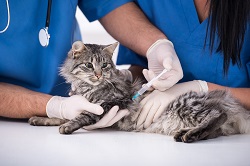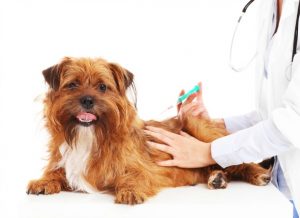
Protect your pet’s health and yours, too–that’s why your Richmond Hill veterinarians urge keeping current with vaccines for both cats and dogs. The veterinarians in Richmond Hill tell clients to maintain a routine vaccination schedule to protect their companions from many contagious, but preventable, diseases.
Every animal is different, so every immunization schedule should be individually tailored to your pet’s specific needs and risk factors. The factors that are considered are health status, breed, age, lifestyle, environment, and travel habits. That means not every pet needs all available vaccinations… but it means also that ALL dogs and cats need some vaccinations. In general, vaccinations cost considerably less than the treatments available for the diseases pets are normally vaccinated against. Every pet should be vaccinated — even indoor dogs and cats can be exposed to a rabid bat, the number ONE transmitter of rabies in our area. Rabies is a deadly disease for pets and humans and therefore it is legally required by law to vaccinate your dogs and even indoor cats against Rabies.
Risks for various types of diseases will vary from city to city across the country, and may even fluctuate within different areas of the same city. This is why it is so important to work closely with your veterinarian in Richmond Hill to determine which immunizations are important for your pet, and how often he should have them.
Vaccines work by stimulating the animal’s immune system. They contain modified viruses or bacteria that can’t cause the disease. Should your pet later be exposed to that disease, the immune system will react quickly to destroy the disease-causing agent. However, the protection derived from vaccines declines over time which is why we need to repeat or booster the vaccines.
How Disease Spreads
Many pet owners question the need for annual and every 3 year vaccines. If their pet doesn’t roam outdoors, what’s the risk?
Surprisingly, just like human disease, pet illnesses spread in various ways. Contact with urine, feces, blood and saliva are common modes of transmission–even in small amounts. So, if Fido or Fluffy slips outside accidentally, even briefly, he or she is exposed to the illnesses a roving deer or unsupervised family pet carry. And, just as humans catch colds and the flu from respiratory droplets in the air, pet diseases can be airborne and caught through an open window or screen door.
Additionally, as clean as your boarding kennel or groomer’s shop may be, those environments spread disease. Contact with other animals at shows and dog parks pose risk, too.
Starting Immunizations
To build-up the immune system of kittens and puppies, the veterinarians in Richmond Hill begin a series of vaccines as early as 6 weeks of age. The doctor carefully examines your pet and sets a shot schedule that makes sense for:
- the legal requirements of your municipality
- your geographical location
- your pet’s lifestyle (doggie daycare, farm cat, etc.)
The doctor administers booster shots every 1 to 3 years as needed and may draw blood for a test called a titer. A titer measures how much immunity an animal currently has against a particular disease.
Essential Vaccines
Dogs require immunization against several diseases including:
Cats needs several shots, too, including:
- rabies
- parleukopenia
- viral rhinotracheitis
- calcicivirus
Some vaccines are given in combination injections, reducing the need for multiple needle sticks.
Are Vaccines Safe?
The American Veterinary Medical Association states that “core” and “non-core” vaccines are safe for pets and that reactions are generally mild and localized. They include pain and mild swelling at the injection site. While allergic reactions rarely occur, they can happen. So, pet owners should call their veterinarian in Richmond Hill right away if a pet experiences vomiting, excessive listlessness or trouble breathing.
Keep Current
If you are unsure about your dog or cat’s vaccination status, call Bayview Seven Animal Hospital for an appointment. The veterinarians in Richmond Hill will examine your pet and set a vaccination schedule appropriate for his or her age and daily routine. Call (905) 764-1144
If you found this blog informative, please share it with your friends on Facebook . Please call us (905)764-1144 for any questions or search for more articles on our website: www.bayviewsevenanimalhospital.ca
Sincerely,
Dr. Howard Covant B.Sc., D.V.M., Ph.D. 
“Your healthy companion is our pride & joy”
Bayview Seven Animal Hospital, a veterinary clinic located on Hwy.7, one block West of Yonge, serving all pets in Markham, Richmond Hill, Thornhill, Vaughan and North York since 1988. We are your family vets for dogs, cats, rabbits, pocket pets and birds.
Disclaimer: No part of this website constitutes medical advice. Readers are advised to consult with their veterinarian.

